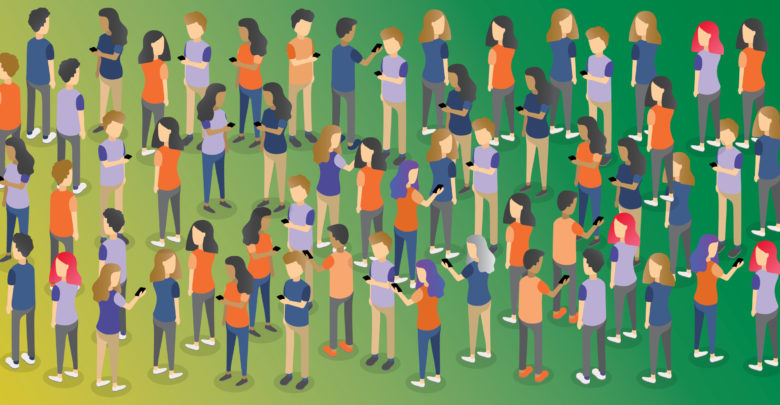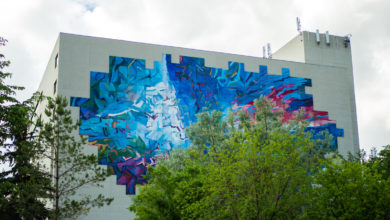 Peter Elima
Peter ElimaMost of us on the University of Alberta campus have grown up intertwined with the internet. We are digital natives; social interaction on the web is just as natural as in-person communication to us. An essential part of our self-understanding as U of A students, then, comes not just from us interacting in physical space — taking classes, participating in extracurriculars, and partying with our pals — but also in the digital space of social media.
While the U of A has a plethora of social media pages dedicated to official campus organizations and events, there are a few private U of A pages that serve several purposes: asking questions about registration; sharing unique campus experiences; and even laughing at the U of A itself. How do all these pages operate differently, and how do they create a sense of identity on campus?
A block away from the Enbridge Centre, I’m grabbing coffee with Ross Lockwood, the man who started one of the biggest U of A social media pages out there. Sitting at a table on a patio enclosed by office buildings, we sip coffee and talk about the origins of Overheard at the University of Alberta.
Overheard was started by Lockwood and a few friends back in 2007, back when Lockwood was in his third year of a physics degree and before Facebook allowed photo posts. Inspired by the blog Overheard in New York and the quote wall tradition in Lister, Lockwood says that the group mostly just wanted a fun space for U of A students to talk about the weird and wacky stuff they’d heard on campus.
“[Overheard] was initially a small group, so maybe like five people had access to it,” he says. “But we made it public and more people found it useful — it’s a good platform for discussions and things like that.”
Due to its public status, the group began to grow very quickly. Overheard now has over 20,000 members, with posts being made daily. Overheard posts are supposed to tackle interesting, odd, or hilarious things overheard or seen on campus. Often this takes the form of text posts recalling snippets of conversation heard in a library; other times it’s bizarre photos of campus happenings.
“If Overheard didn’t exist, where would these people be expressing themselves, and where would that expression be appreciated?”
Lockwood says that one of the reasons the group is great for U of A students is because it allows people to make connections that they may not have the chance to make in person. He cites Ray Dagg, a custodian at the University Station LRT stop, as one of the prime examples. Dagg, who has become a beloved figure in the group, often posts nature photos from around campus, which get a sizable amount of attention.
“I think for a lot of people, being able to develop a community without face-to-face interaction is really good,” he says. “My question is, if Overheard didn’t exist, where would these people be expressing themselves, and where would that expression be appreciated?”
With the expansion of the group and Facebook adding new features over the years, the strictness of this doctrine has changed a bit. But its core philosophy has remained the same: make posts that are relevant to the U of A community.
“Overheard has always [been about] what’s relevant to the university community,” Lockwood says. “Memes might be funny for a subset of people, they might be annoying for another subset, but we really go for, ‘does this contribute anything of value to the community at large?’”
This value is not just humorous or light-hearted anymore; at times, Overheard has been at the centre of more serious campus going-ons. One such event happened on October 21 2016, when multiple Overheard members began posting anecdotes about a man contemplating jumping off the sixth floor of CCIS (the man was later taken to hospital without injury). The incident, which was still ongoing when the first posts were made, sparked rampant discussion around the man’s motivations, if he was safe, and how mental health is dealt with on campus. For Lockwood and the admin team at Overheard, this was a moment when they realized they needed to step up. They decided to include several campus and Edmonton mental health and distress line services on their page.
“We were like, if it’s something that happens on campus and this person didn’t have access to resources, we need to be the place where those resources exist,” Lockwood says. “Where else would somebody look for help? One of the first places that people get introduced to digitally… [at] university, is Overheard.”
A year before the CCIS incident, an Overheard post was made about Evan Tran, a U of A student who died by suicide. Tran was well-known on campus; he was a moderator on the Facebook page University of Alberta Compliments, volunteered with the Dean of Students office for their mental health initiatives, was a member of Students’ Council and General Faculties Council, and volunteered for various student groups. The post mentioning Tran has over 1,900 likes. Commenters are gave their condolences, offered solidarity with Tran’s family and other students on campus, and shared links to campus resources.
For Overheard admin and recent U of A engineering graduate Subhashis Chikoritaborty, this is one of his favorite moments he’s seen on the page.
“The amount of support I saw from faculty, [Tran’s] friends, and everyone who was close… was absolutely incredible,” he tells me.
Posts like these, and the reactions they’ve garnered, seem to represent the other side of the discussion space that Overheard is attempting to foster: one that’s not just about funny happenings, but also about vulnerable campus moments and the issues that affect all U of A students.
“We want to create a discussion space where people should feel free to discuss [serious] things, [and] I think Overheard can provide that kind of space because it’s high-traffic,” Chikoritaborty says. “If you can share something like that [or] something vulnerable, we try to create a space where people can share those thoughts and feel a bit of comfort.”
Moving on from Facebook, we come to reddit. More specifically, we come to r/uAlberta, the de-facto subreddit for the U of A community. Founded in 2011 and just over 13,500 members strong, the subreddit is a place for students to ask questions about anything related to their degree, including the quality of certain profs, how to register in certain courses, and what program is best to enroll in. Users have created lengthy guides for various programs and have told varied stories about their U of A experiences; some incredible successes, and some failures as well.
u/firesofpompeii, one of the admins of the subreddit and recent graduate from molecular genetics, says that the subreddit is set apart from other social media sites due to two things: its emphasis on anonymity, and its focus on user engagement.
“With reddit in general, anyone can post at any time, [and] although there are users who are more well-known, it’s not like there are popular users who a lot of people follow,” he says. “[Everyone is] at an equal playing field, which you don’t always get with other social media platforms.”
The subreddit is not just a place to ask questions. Much like Overheard, r/ualberta has become a locus for campus discussion; unlike Overheard, however, the subreddit’s user anonymity has led to the rise and fall of several trollish characters.
“If you were to sort of say something in a kind of ‘normal’ way, often it doesn’t get much traction on those sites, but if you say it in a more extreme way, you might get more of a reaction.”
There’s been a few notorious users on the subreddit who have drawn the ire of many of the subreddit’s frequenters. The most notorious of them all, however, was u/unsunghero. They initially drew the ire of the subreddit by starting a thread called “Am I too Competitive?”. In the thread, they detailed how they would scout out classes considered GPA boosters and ask the professors to curve the class average down, all because they “[wanted] to protect the sanctity of the A grade.”
u/unsunghero would continue to troll the subreddit and share many controversial opinions, and soon the moderators of r/uAlberta were getting complaints. They couldn’t do much, however, because u/unsunghero technically wasn’t violating the rules of the subreddit. As long as a user is being civil in expressing their opinion, even if it is one that many people disagree with, the moderators let their posts stand.
“We’ve had a lot of users complain about them, that’s why we’ve had to tell them that until they’re attacking other subscribers then there’s nothing we can really do about it,” u/firesofpompeii says. “We definitely don’t want to censor people.”
To anyone who’s spent anytime online, this kind of behaviour isn’t unusual. Johnathan Cohn, an assistant professor in the department of English at the U of A whose research focuses on critical internet studies and digital culture, says that digital spaces often lend themselves to this kind of behaviour. This is both because they’re a relatively safe space to perform different identities and figure out who you are, and because these sites encourage more extreme modes of behaviour.
“If you were to sort of say something in a kind of ‘normal’ way, often it doesn’t get much traction on those sites, but if you say it in a more extreme way, you might get more of a reaction,” Cohn says. “So it also sort of encourages people who are more extreme, in one way or another, to interact more, and it discourages people who maybe don’t like that kind of interaction.”
Trolls aren’t the only thing that the subreddit occasionally fosters. It has broken out into meme territory as well, creating lore that has arguably given the community its own identity and history beyond being a forum for student questions.
The most recent example of such territory is the Ghoul Wars, a saga that began on January 24 2019 with a post by u/lividnaynay that spoke of an experience they had with a particularly unhygienic student. Three days later, u/RogerMooreIsMyDad made a post stating “I swear im (sic) going to buy a costco pack of deodorant and hand it out to all the little engg ghouls running around DICE.”
That was enough to set off a dramatized war between the Ghouls and the Resistance. Posts were made detailing battle plans for the war, casualty reports, and the development of ghoul-repellant technology. Dozens upon dozens of these posts sprung up; it felt like an augmented reality game had suddenly began on the subreddit.
When I ask u/firesofpompeii about the Ghoul War, he simply laughs; I can practically hear his head shake over the phone.
“That kinda made me feel really old, cause I had no idea what was going on,” he says. “I was just kind of a bystander to that.”
In his five years as admin, this isn’t the first time u/firesofpompeii has seen events like the Ghoul War arise. Back in 2016, r/uAlberta and r/UCalgary had a meme war, flaming each other in various memes over a period of a few months. Events like this are apparently cyclical on the subreddit; they come and go, cementing themselves as defining moments in the development of the rhetoric and identity of the subreddit.
With each of these cycles, r/uAlberta slowly becomes its own community apart from the physical U of A.
The term “meme” was first coined by Richard Dawkins in his book The Selfish Gene. For Dawkins, memes are like genes of culture; they are ideas and concepts that spread in communities and get passed down over time. A meme’s fidelity — how well it can retain its original idea as it spreads — varies depending on the specificity of the idea. Oftentimes memes with community-specific ideas don’t travel very far, whiles memes with more generalizable ideas do.
This can be seen in the different content U of A-related Instagram meme pages put out. Some pages like @ualberta_memes stick very close to U of A material, with past topics including Konz (a short-lived and universally hated pizza place in the Students’ Union Building), the UASU, and other U of A happenings. Other pages, like @uofaenggmemes seem to take general engineering student memes and put a U of A label on them.
“[More generalized memes] translate very broadly but are very weak in their transmission,” Cohn says. “They can be rethought and reused in a lot of ways, but the original meaning or community [from whence the meme came] gets lost very quickly.”
@ualberta_memes is the biggest U of A Instagram meme page, having gained over 6,600 followers since its start on February 4 2019. The admin of the page — a third-year kinesiology student who wishes to remain anonymous — tells me over the phone that he started the page as a way to kill boredom. He posted a few memes on that fateful day, and the response he received encouraged him to continue.
“We can either come to school and just clock-in clock-out, or you can look at everything around you and kind of care a little more than you usually do.”
@ualberta_memes sources his content from a variety of places. Typically he makes the memes himself and posts them directly to his page, but he also will post submissions and take ideas for memes. The core of his content, in typical internet meme fashion, pokes fun at a group; namely, the various faculties on campus.
“A lot of it is just to show that we all have faults and we can all kind of make fun of ourselves to a certain level,” he says.
@ualberta_memes feels personally that the U of A lacks a strong sense of culture, given how large the school is and that people from all over the world attend it. Through making posts that highlight universal U of A experiences — like the disaster that was Konz or Lister’s dodgeball culture — @ualberta_memes hopes to help students feel more connected to their campus.
“You get people [starting] to care a little more about the small things that you see on campus,” he says. “That’s kind of important because we can either come to school and just clock-in clock-out, or you can look at everything around you and kind of care a little more than you usually do.”
In this way, students are able to feel more attached to their campus and to each other in more tangible ways; instead of simply proclaiming “I’m a U of A student because I go to the U of A,” students can begin to point out the multitude of small, specific details that make up their campus experience.
Another account, @ualbertameme, started just a month after @ualberta_memes. The main admin of the page — a third-year science student who also wished to remain anonymous — was inspired to start his page in a similar way to @ualberta_memes.
When sourcing posts for the page, @ualbertameme looks for universal U of A experiences that are easily translatable into memes. The page is run by a small team of about five people, all of whom work on different aspects of the page; some post content, others check analytics, and others handle responding to DMs and comments from followers.
Some of the feedback that @ualbertameme has gotten from his followers is that his page’s memes help boost student morale, especially during exam season. In a way, being able to laugh about the experience of being a U of A student helps to bring people together and make student life a little easier.
“University is supposed to be a relatively fun experience, although it can get really difficult at times,” he says. “I guess seeing things like memes kind of helps alleviate the pressure or the anxiety that comes with university.”
What makes an Instagram meme page different from hanging out on Overheard or r/uAlberta? Both page admins have different answers. For @ualberta_memes, it’s having an anonymous admin post all the memes. He can post memes on behalf of people who are afraid of judgement, and can also act as a scapegoat in case someone gets upset about their faculty being made fun of.
“The whole anonymous aspect of me posting, I think, gives people more comfort to comment what they want,” he says. “It doesn’t have to feel like whoever is posting it might be made fun of or might be judged by their friends or something.”
“It’s easy on these sites to feel like you have nothing to contribute and that therefore you’re not part of the community, but that’s the normal situation.”
For @ualbertameme, it’s the relaxed nature of Instagram pages, which don’t have to have as strict of accountability measures as other platforms.
“Certain pages like Overheard, they have to appear [to have] a certain level of responsibility and accountability,” he says. “On meme pages, people can post whatever they want and there wouldn’t really be any repercussions unless it’s a very serious thing.”
***
If there’s one thing all of these pages try to do, it’s capture fragments of the U of A student experience and provide a space for them to be disseminated and discussed. With their varying degrees of anonymity, subject matter, and unique rhetoric and rules, each page fills a different niche.
Many of us may feel out of place on these pages; we may lurk instead of post, feeling out of place or feeling like we lack something to contribute. But as Cohn said before, most people who post on these pages are on the hyper end of extroverted, and they likely only make up a small percentage of the group.
“If you’re someone in these groups who doesn’t post much and you feel sort of marginal, you are actually the norm,” he says. “It’s easy on these sites to feel like you have nothing to contribute and that therefore you’re not part of the community, but that’s the normal situation.”
Lurker or poster, we all can feel more connected to our campus through these pages. They bring us together in times of need, alleviate exam pain, foster discussion about issues on campus, and help us begin to love the little things about being a U of A student.
These pages, arguably, are just as integral to being a U of A student as going to class.







